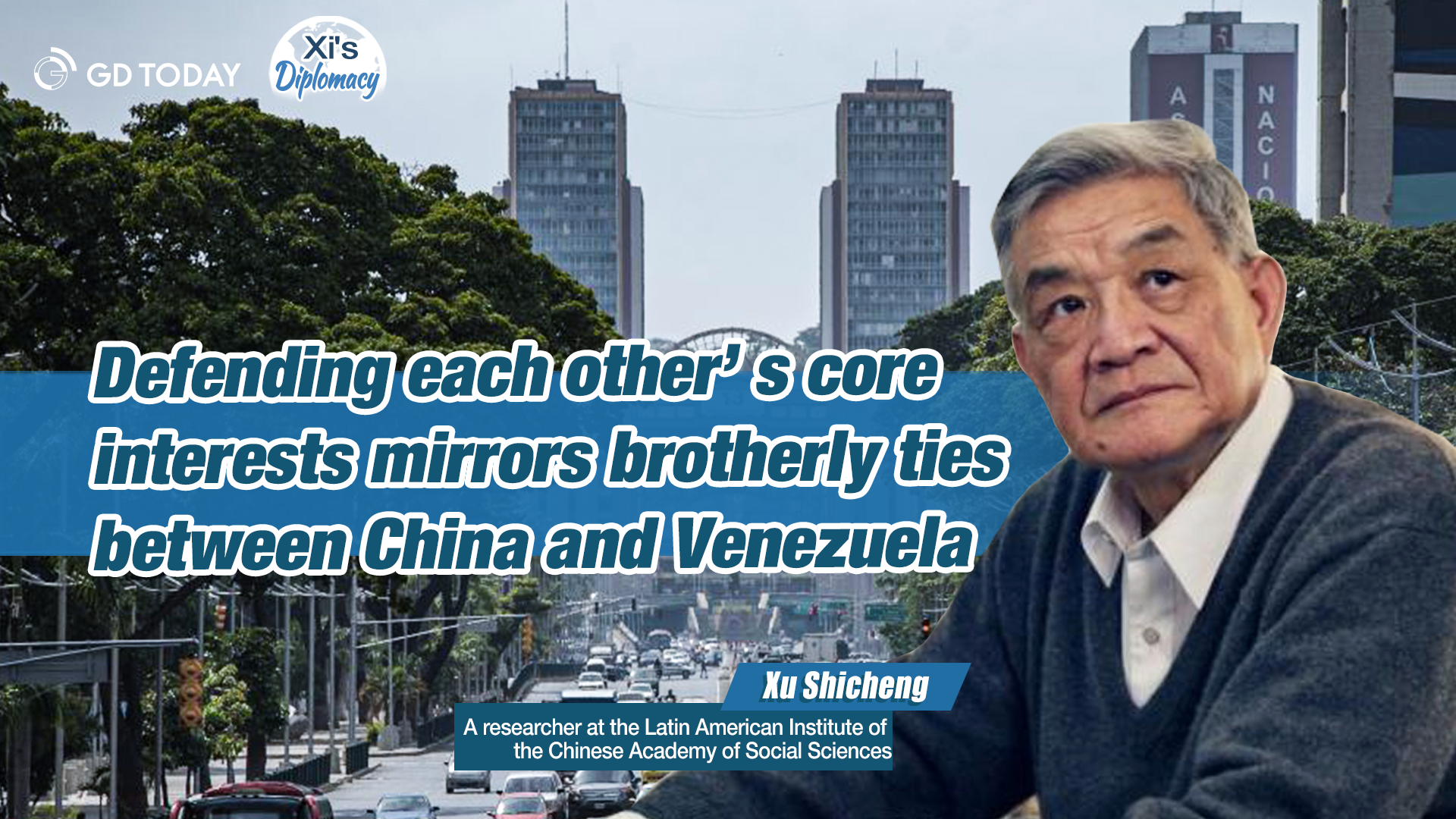“China and Venezuela have been safeguarding each other’s core interests on the international stage, which is a vivid portrayal of their unbreakable ironclad friendship,” said Xu Shicheng, an authoritative expert on Latin America in China and a researcher at the Latin American Institute of the Chinese Academy of Social Sciences, in a recent interview with GDToday.

At the invitation of President Xi Jinping, President of the Bolivarian Republic of Venezuela, Nicolás Maduro Moros, is paying a state visit to China from Sept. 8 to 14. President Maduro kicked off his trip in the tech hub of Shenzhen in south China’s Guangdong Province, and called this visit a “historic” visit on social media.
Maduro’s visit is not money-oriented
“It’s been five years since Maduro’s last state visit in 2018, and many diplomats and high officials, including the vice president and ministers of key departments, joined Venezuela’s recent visits to China. I believe there will be more agreements covering the oil industry, agriculture, technology, trade, infrastructure, culture and education released soon,” Xu shared his insights on why Maduro sees this visit as a historic one.
On Sept. 13, the two presidents announced the elevation of the China-Venezuela relationship to an all-weather strategic partnership.
However, Western media speculated whether China was concerned that the debt would not be repaid, and Maduro’s determination of this trip may be money-oriented.
According to Xu, it is unfair to judge the China-Venezuela relationship in this way because the two countries have an established, mature relationship that has grown over time.
Xu continued that both countries saw fruitful results in pragmatic cooperation in various fields during Maduro’s trip, and finance is not the only focus.
“We should see it from a whole picture. Venezuela is suffering from a hard time due to the unilateral coercive measures imposed by the United States and its allies against Venezuela, and it is enduring a slow recovery from the oil industry. We should not force it to pay back at its difficulties.”
According to Maduro, China’s support for the South American country has also been essential, given Venezuela’s strenuous struggle under more than 950 illegal sanctions imposed by the United States and other Western powers.
“China and Venezuela have been strongly supporting each other. That’s the real friendship,” said Xu.
Shenzhen’s experience constructive for Venezuelan SEZ
Guangdong and Venezuela have a strong tie. It is reported that 90 percent of overseas Chinese in Venezuela are from Guangdong.
Regarding his decision to choose Guangdong’s Shenzhen as the first stop of his trip, Maduro said that the city is a significant hub for those seeking the source of development, technology, and new inventions, making it an excellent starting point for his visit.
In 2022, President Maduro signed a Special Economic Zones (SEZ) law, enabling the government to offer tax, financial, and legal incentives to encourage both national and international investment in selected regions of the country.
On Sept. 9, Venezuela and China signed a Memorandum of Understanding between the National Superintendence of Special Economic Zones of Venezuela and the Special Economic Zones Research Center of Shenzhen University of China.
“That’s why he visited Shenzhen first. Venezuela is willing to learn from China’s experience in building special economic zones, and the governor of La Guria, a port city in the northern Federal District of Venezuela, will come to Shenzhen for further practice of this MOU,” said Xu.
Maduro also noted, “We are embarking on a new path, a path that Shenzhen has already pioneered.” He believes that Shenzhen’s 43 years of experience in constructing special economic zones provide valuable insights for Venezuela.
High-tech cooperation features in this trip
In addition to Shenzhen’s tech companies, President Maduro also visited Shanghai’s Zhangjiang AIsland featuring AI and Beijing’s China Academy of Aerospace Technology, highlighting high-tech cooperation.
During this visit, Venezuela signed a new MOU with the China Academy of Aerospace Technology.
“It’s been five years since his last trip. Great changes and remarkable technological development have been made in China.” Xu held that this visit also prioritizes aerospace cooperation as one of the focuses in technology.
China launched Venezuela’s remote sensing satellite, VRSS-2, in 2017, following the launching of the Venesat-1 in 2008 and the VRSS-1in 2012.
The joint statement issued by China and Venezuela on Sept. 14, stated that both two countries are willing to launch cooperation in the field of aerospace, such as designing satellites, the exploration of the moon, and more.
On Sept. 14, 2018, China and Venezuela signed a Memorandum of Understanding (MOU) for cooperation on the Belt and Road Initiative (BRI). Today marks the fifth anniversary of the signing of this MOU.
“The signing of this MOU brings China and Venezuela further closer. 502 cooperation agreements were made on the 16th Meeting of the China-Venezuela High-level Mixed Committee on Sept. 14, 2018,” said Xu.
Xu expects to see more agreements on technology and other fields reached under the BRI in the next step.
Reporter: Rofel
Poster: Lulu
Editor: Wing Zhang, Steven Yuen, James
















